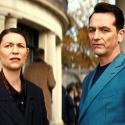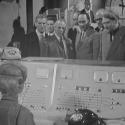For most of us, reaching the age of 50 prompts a mature recognition of faded aspirations, balanced by some degree of respect, influence, and tender familial consolation. Most observers would say Match of the Day fits that pattern quite closely. Its more youthful, dynamic days are remembered with great respect, though it’s politely acknowledged to be wearier and wrinklier than before, its fiftieth birthday is an occasion for dignity and circumspection.
So it was a surprise to find this celebration of Match of the Day’s 50 years combining the giddy nausea of a toddlers’ bouncy castle party with the emotional self-importance of a teenage promenade. From the first seconds of portentous voice over, linking Match of the Day’s arrival in a bizarrely grandiose fashion with the launch of satellite communications, self-awareness and proportion were cast aside, and rampant narcissism was the order of the day.
The BBC chequebook has been opened like Roman Abramovich’s for the programme’s appearance fees. The most expensive sporting and showbiz talent on the planet was gathered to pat itself on the back, as David Beckham, Thierry Henry, Russell Brand and José Mourinho opined solemnly on the unmissable qualities of the show, over unlikely footage of a grassroots match (amateur participation has been falling for years) playing in the background. The ordinary fan got precious little look-in, though he (and it is usually he) may not have minded that, given the amount of time he would have spent on set in the company of Piers Morgan and Lord Sugar, who were busy acting out their drearily contrived Twitter spat. The parade of self-congratulation at times became positively orgiastic.
Online fan forums contain as many technical debates about pass completions and tactical structure as crude intimations of the referee’s tendency to self-abuse
It wasn’t all bad. The early years were evoked engagingly, if rather briefly, and the role television played in making footballers celebrities noted without the slightest hint of irony by Beckham, Lineker, etc. Hillsborough was remembered respectfully. There was an endearing three minutes with Ghanaian wonder-striker Tony Yeboah. It is still the most-watched football programme on TV, attracting over five million viewers.
There was, however, no awareness of how the programme is being outflanked not just by the super-rich satellite broadcasters, offering hours of lavish live coverage, but also, in a different way, by niche, statistics-driven outfits broadcasting sophisticated technical analysis of the game on social media and smartphone apps. Online fan forums contain as many technical debates about pass completions and tactical structure as crude intimations of the referee’s tendency to self-abuse. Both of these areas of the game are growing; all Match of the Day can offer in return is pub banter and Harry Redknapp’s nostalgia about his nine-inch black-and-white telly.
But why bother your head with that while the show is still on the road, the pundits’ golfing jaunts are paid for, and there are tanned, muscular backs to be slapped? If it makes 60 in anything like its current form I will eat my keyboard.















Add comment